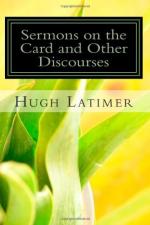good thing, and allowed of God: but the abuse
of such things is reproved. Husbandman, and
married man, every one in his calling, may use and
do the works of his calling. The husbandman
may go to plough; they may buy and sell; also, men
may marry; but they may not set their hearts upon it.
The husbandman may not so apply his husbandry to
set aside the hearing of the word of God; for when
he doth so, he sinneth damnably: for he more regardeth
his husbandry than God and his word; he hath all lust
and pleasure in his husbandry, which pleasure is naught.
As there be many husbandmen which will not come to
service; they make their excuses that they have other
business: but this excusing is naught; for commonly
they go about wicked matters, and yet they would excuse
themselves, to make themselves faultless; or, at the
least way, they will diminish their faults, which
thing itself is a great wickedness; to do wickedly,
and then to defend that same wickedness, to neglect
and despise God’s word, and then to excuse such
doings, like as these men do here in this gospel.
The husbandman saith, “I have bought a farm;
therefore have me excused: the other saith, I
have bought five yoke of oxen; I pray thee have me
excused:” Now when he cometh to the married
man, that same fellow saith not, “Have me excused,”
as the others say; but he only saith, “I cannot
come.” Where it is to be noted, that the
affections of carnal lusts and concupiscence are the
strongest above all the other: for there be some
men which set all their hearts upon voluptuousness;
they regard nothing else, neither God nor his word;
and therefore this married man saith, “I cannot
come;” because his affections are more strong
and more vehement than the other men’s were.
But what shall be their reward which refuse to come?
The house-father saith, “I say unto you, that
none of those men which were bidden shall taste of
my supper.” With these words Christ our
Saviour teacheth us, that all those that love better
worldly things than God and his word shall be shut
out from his supper; that is to say, from everlasting
joy and felicity: for it is a great matter to
despise God’s word, or the minister of the same;
for the office of preaching is the office of salvation;
it hath warrants in scripture, it is grounded upon
God’s word. St. Paul to the Romans maketh
a gradation of such-wise: Omnis quicunque
invocaverit nomen Domini salvabitur: quomodo ergo
invocabunt in quem non crediderunt, aut quomodo credent
ei quem non audisrunt? that is to say, “Whosoever
shall call on the name of the Lord, shall be saved:
but how shall they call upon him, in whom they believe
not? How shall they believe on him of whom they
have not heard? How shall they hear without
a preacher? And how shall they preach, except
they be sent?” At the length he concludeth,
saying, Fides ex auditu; “Faith cometh
by hearing.” Where ye may perceive, how
necessary a thing it is to hear God’s word,




